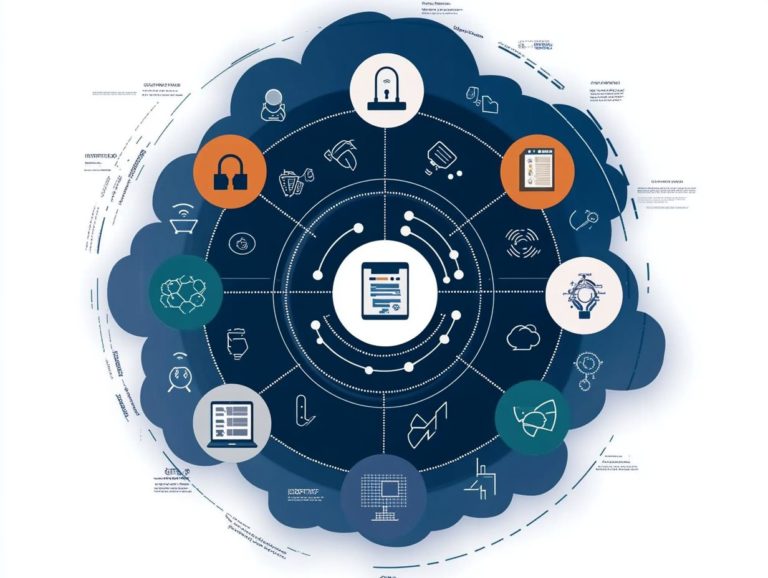Cloud Security and Data Backup: What You Need to Know
Don’t wait! Understanding cloud security and data backup is critical to keeping your sensitive information safe. As businesses increasingly turn to cloud services, safeguarding that information becomes a paramount concern.
This article delves into the fundamentals of cloud security, highlighting the critical importance of data backup and the common threats that could jeopardize your data.
Get ready to discover best practices that will protect your data today and insightful tips for selecting a dependable cloud service provider.
Immerse yourself in this knowledge to ensure the safety of your digital assets.
Contents
Key Takeaways:

- Cloud security is crucial for protecting sensitive data stored in the cloud.
- It involves various measures such as encryption, access controls, and regular updates to ensure data is safe from cyber threats.
- Data backup is essential to safeguard against data loss due to cyber attacks, hardware failure, or human error.
- Regular backups can help minimize downtime and ensure business continuity.
- To ensure robust cloud security, it is important to identify and prevent common threats such as malware, phishing, and insider attacks.
- Regular security audits and employee training can help mitigate these risks.
Understanding Cloud Security
Understanding cloud security is paramount for municipalities and organizations seeking to safeguard sensitive information from cyber threats, including ransomware attacks and data breaches.
You need a solid strategy that includes strong security standards, adherence to regulatory compliance such as General Data Protection Regulation and Payment Card Industry standards, and the deployment of advanced cloud technologies to ensure data integrity and privacy.
As cyberattacks grow more sophisticated, possessing a thorough grasp of cloud security practices becomes essential for IT staff. This knowledge enables them to maintain a secure cloud environment that supports effective data management and enhances operational efficiency.
What is Cloud Security?
Cloud security encompasses a set of tools specifically designed to protect your data, applications, and infrastructures in cloud environments from cyberattacks and unauthorized access.
It includes critical components aimed at safeguarding sensitive information, such as robust data encryption techniques that keep your data indecipherable to anyone without authorization.
Access controls are essential, as they regulate who can view or modify your data, effectively limiting exposure to potential threats. Adhering to established security standards provides frameworks that help maintain compliance and enhance your protection protocols.
Together, these elements work in harmony to guard against breaches and uphold data integrity. This ensures that your information remains accurate and trustworthy over time.
Types of Cloud Security
You can implement several types of cloud security measures to fortify your organization, including data encryption, access controls, and adherence to established security standards.
These measures create a comprehensive framework that includes network security, application security, and data security all vital for protecting sensitive information.
Network security focuses on safeguarding the integrity of data in transit, utilizing firewalls and intrusion detection systems to keep threats at bay.
Meanwhile, application security ensures that the software running in the cloud is free from vulnerabilities, employing strategies like regular patching and secure coding practices.
Data security involves measures such as encryption and robust backup solutions, effectively minimizing the risks of data breaches and unauthorized access.
Together, these components create a fortified environment essential for maintaining the trust of clients and stakeholders in today’s increasingly digital landscape.
Importance of Data Backup
Data backup is essential for your business, especially as threats like ransomware attacks and data loss continue to rise.
It underscores the importance of having a robust cloud data backup strategy in place not just for effective data recovery, but also for ensuring seamless business continuity.
Start implementing these strategies today to secure your digital assets!
Why is Data Backup Necessary?

Data backup is essential for recovering from data loss. This loss can occur due to cyberattacks, user errors, or system failures.
By implementing a solid backup strategy, you can preserve your operational efficiency and minimize downtime. In today’s digital world, a strong backup strategy is vital. It acts as a safety net for everyday operations and disaster recovery.
For example, if your company falls victim to a ransomware attack, having reliable backups enables you to swiftly restore your systems without paying a hefty ransom. Following data privacy laws, such as GDPR or HIPAA, is essential for protecting sensitive information and often requires regular data backups to avoid potential penalties and legal repercussions.
By prioritizing data backup, you can shield your business from financial loss and reputational damage. This ensures long-term sustainability and fosters trust in your operations.
Common Threats to Cloud Security
You should be aware that common threats to cloud security include various cyberattacks, such as ransomware, data breaches, and unauthorized access. These risks can have a profound impact on organizations and the sensitive information they hold, potentially leading to significant repercussions.
Types of Cyber Attacks
You ll encounter various types of cyberattacks today, such as ransomware, phishing, and data breaches. Each brings its own set of challenges to cloud security.
These attacks often exploit vulnerabilities in cloud infrastructures, infiltrating sensitive data and jeopardizing not just the information itself but also the trust clients place in your business.
For example, ransomware can encrypt critical files stored in the cloud, demanding a hefty ransom for their release. Meanwhile, sophisticated phishing schemes can easily trick employees into revealing access credentials.
Data breaches can arise when unauthorized individuals exploit weak access controls, leading to potential legal issues and significant financial losses. With the growing reliance on cloud solutions, it s crucial for you to bolster your defenses against these escalating cyber threats.
How to Identify and Prevent Threats
Identifying and preventing threats to cloud security requires you to implement effective detection methods, maintain constant data monitoring, and establish robust security controls to mitigate risks.
Proactive monitoring and auditing of your cloud environments are essential for spotting vulnerabilities before they can be exploited. By utilizing advanced security information and event management (SIEM) tools, which help monitor security in real-time, you can continuously analyze logs and alerts, allowing for swift responses to suspicious activities.
Regular vulnerability assessments and testing for security weaknesses are also key; they help you pinpoint weaknesses in your security configurations.
Best practices include:
- Establishing a well-defined incident response plan
- Ensuring that your teams are trained to handle potential breaches
- Implementing multi-factor authentication to strengthen your access controls
These strategies not only enhance your security posture but also cultivate a culture of vigilance and preparedness within your organization.
Best Practices for Cloud Security and Data Backup
Implementing best practices for cloud security and data backup is crucial for safeguarding your sensitive information, including how to protect your data in the cloud, while ensuring compliance with industry regulations.
By doing so, you significantly reduce the risk of security breaches and compliance violations. Protecting both your assets and your reputation in an increasingly digital landscape is essential.
Tips for Securing Your Data and Backing it Up

Secure your data by following best practices. Use multi-factor authentication, set user access controls, and choose a reliable remote backup solution.
By adopting these strategies, you can significantly reduce the risk of unauthorized access and data breaches. Multi-factor authentication adds an extra step beyond just using passwords, making it harder for hackers to access your systems.
Proper user access controls ensure that only authorized personnel can access sensitive information, effectively limiting exposure to potential threats.
A dependable remote backup solution guarantees that your data remains safe even in adverse situations, such as hardware failures or cyberattacks.
This holistic approach to cybersecurity and data management not only safeguards your valuable assets but also fosters trust among your stakeholders and customers.
Choosing a Reliable Cloud Service Provider
Selecting a trustworthy cloud service provider is essential for your organization. It ensures compliance with data privacy laws, adherence to security standards, and robust disaster recovery capabilities.
This decision lays the foundation for safeguarding your valuable data and maintaining operational integrity in an increasingly digital landscape.
Factors to Consider
When evaluating cloud service providers, consider key factors such as their adherence to data compliance regulations, the strength of their security controls, and their policies on data retention and management.
These aspects play a crucial role in safeguarding sensitive information and ensuring the overall reliability of the service.
Compliance with regulations guarantees that the provider follows best practices for data protection, which is essential in today s digital landscape.
The robustness of their security protocols can thwart potential breaches, enhancing your operational efficiency.
Additionally, transparent data retention and management policies give you clarity over your data lifecycle, significantly reducing risks related to data loss or unauthorized access.
Utilizing data analytics tools can further improve operational efficiency by providing insights for informed decisions, fostering a secure environment where your organization can thrive.
Frequently Asked Questions
What is cloud security and why is it important?
Cloud security refers to the practices and technologies used to protect data and information stored in cloud computing systems. It is crucial because it ensures that sensitive information is secure from unauthorized access, data breaches, and cyberattacks.
How does cloud security work?

Cloud security works by implementing various security measures, such as encryption, access controls, and firewalls, to protect data stored in the cloud. It also involves regular monitoring and updates to identify and mitigate potential security risks.
What are the common threats to cloud security?
Some common threats to cloud security include data breaches, malware attacks, insider threats, and misconfigurations. These can result in data loss, unauthorized access, and service disruptions.
What is data backup and why is it important?
Data backup is the process of creating copies of data for disaster recovery purposes. It is vital because it ensures that data can be recovered in case of accidental deletion, hardware failure, or cyberattacks.
How does data backup work in the cloud?
In the cloud, data backup involves storing copies of data on remote servers, which can be accessed and restored in case of data loss or corruption. This is usually done automatically and regularly to ensure up-to-date backups.
What are the best practices for cloud security and data backup?
Some best practices include using strong passwords, regularly updating software and systems, implementing multi-factor authentication, and frequently testing and reviewing security measures.
It’s also crucial to have a disaster recovery plan in place and regularly test and update data backup procedures.
Don t wait until it s too late secure your data now!






